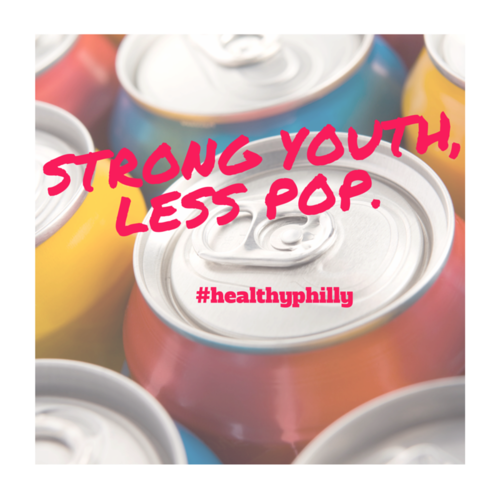Frontline Blog
Philadelphia’s Historic Win-Win for Kids: Funding Poverty Reduction Programs with a New Tax on Sweetened Beverages
July 2016

By Cheryl Bettigole, MD, MPH
Director of Chronic Disease Prevention, Philadelphia Department of Public Health

On June 16, 2016, 13 of the 17 members of Philadelphia’s City Council voted in favor of Bill No. 160176, the Sugar-Sweetened Beverage Tax. Cheers erupted from the groups that had rallied in favor of the tax: pre-K providers, city parks advocates, parents committed to better educational opportunities for their children, the public health community, and many more. And social media went wild.
Multiple well-respected public health authorities ranging from the World Health Organization to the Institute of Medicine have long recommended taxes on sugar-sweetened beverages as part of our battle against obesity and diabetes. Yet until this week, Berkeley stood alone as the only U.S. city that had succeeded in passing such a tax. As we’ve heard here in Philadelphia time and time again, we are not like Berkeley. We are a big city struggling with poverty. Too many of our children end up in prison and too few go to college. And we’ve tried this before: in 2010, and again in 2011, then Mayor Nutter attempted to pass a sugary drink tax, stressing our epidemics of obesity and diabetes. Each time, the City Council turned him down.

But this time, Philadelphia’s effort to pass a tax on sugary drinks was like no other. Instead of touting the sugary beverage tax as a solution to the city’s epidemics of diabetes, obesity, and early death from heart disease – although these points are certainly important – Mayor Kenney proposed taxing these drinks to fund desperately needed programs for our city’s children. Our campaign emphasized the estimated revenue this policy could earn for the city: more than $400 million over five years. Subsidized high quality pre-K, community schools, and improvements to Philadelphia’s ailing parks, recreation centers and libraries struck a chord in the city’s neighborhoods. People whose day-to-day struggles make long-term health risks like diabetes seem less pressing than today’s needs listened, and they joined a diverse coalition that worked to pass the tax. The clarity with which the Mayor laid out the plan for the future revenue helped rally parents, childcare providers, and thousands of others concerned about the future of Philadelphia’s children to the cause.
And the needs of Philadelphia’s children are immense. With one of the highest poverty rates in the country, our children face daunting odds on their way to adulthood. Our school district is chronically underfunded, which means that children who enter school behind in their pre-reading skills are unlikely to ever catch up. Research shows that high quality pre-K can change that. In our poorest neighborhoods, children, especially boys of color, are more likely to end up in prison than to go to college. Libraries and recreation centers provide much needed afterschool havens for kids whose parents have to be at work. But these facilities are in disrepair and many are unsafe. In effect, this policy seizes on two potential opportunities to create healthier environments for Philadelphia kids. In the end, the benefit that moved people most stemmed from the tax’s potential to change the realities of poverty, lack of education, and mass incarceration. And changing these realities will have a profound impact on the health of Philadelphia’s children, an impact that adds immensely to the direct effect the sweetened drink tax will have on health through prevention of obesity and diabetes.
The details of how the tax will be levied are also important. Philadelphia will be taxing sugary and diet drinks at the distributor level, not the consumer level. This makes implementation straightforward, given the limited number of distributors, and leaves open the possibility that the industry may choose not to pass on the full amount of the tax to consumers. The tax will be 1.5 cents per ounce (with an equivalent tax rate for syrups and concentrates) and will be levied starting January 1, 2017 on all non-alcoholic beverages with added sugar-based and artificial sweeteners. Exemptions include baby formula, medical foods, drinks that are 50% or more milk by volume, drinks that contain 50% or more fresh fruit or vegetables by volume (like healthy smoothies), unsweetened drinks to which sweetener is added at the time of serving, and syrups or concentrates that the purchaser mixes for him/herself.
As expected, industry fought back hard. The American Beverage Association spent at least $4 million on ads attacking the tax proposal as a so-called “grocery tax,” claiming that it would double the price of family groceries. The Teamsters’ Union backed them in these claims, further insisting that thousands of jobs will be lost when the tax is implemented (despite no evidence to back up this claim and multiple advocates who have pointed out that we are not taxing thirst).
Thanks to private support, Philadelphians for a Fair Future, the group backing the tax, was able to run ads of its own. These ads, like the Mayor’s statements at multiple community meetings, focused exclusively on the benefits of the use of the tax revenue. Keeping the focus on the needs of Philadelphia’s kids and the plans to use the sugary beverage tax to make a real difference for their future helped create widespread support for the tax. Given Philly’s unsuccessful attempts to pass a similar tax in 2010 and 2011 with messaging based on preventing diabetes and obesity, it seems that this new focus was a game-changer in getting the tax passed.
Our work has only begun. In the coming months, we will be working hard to implement and evaluate this tax, striving to maximize this opportunity given to our city by a committed and visionary City Council. But today, we celebrate the fact that Philadelphia has just taken an exciting step forward to protect our children and open new opportunities for their futures.